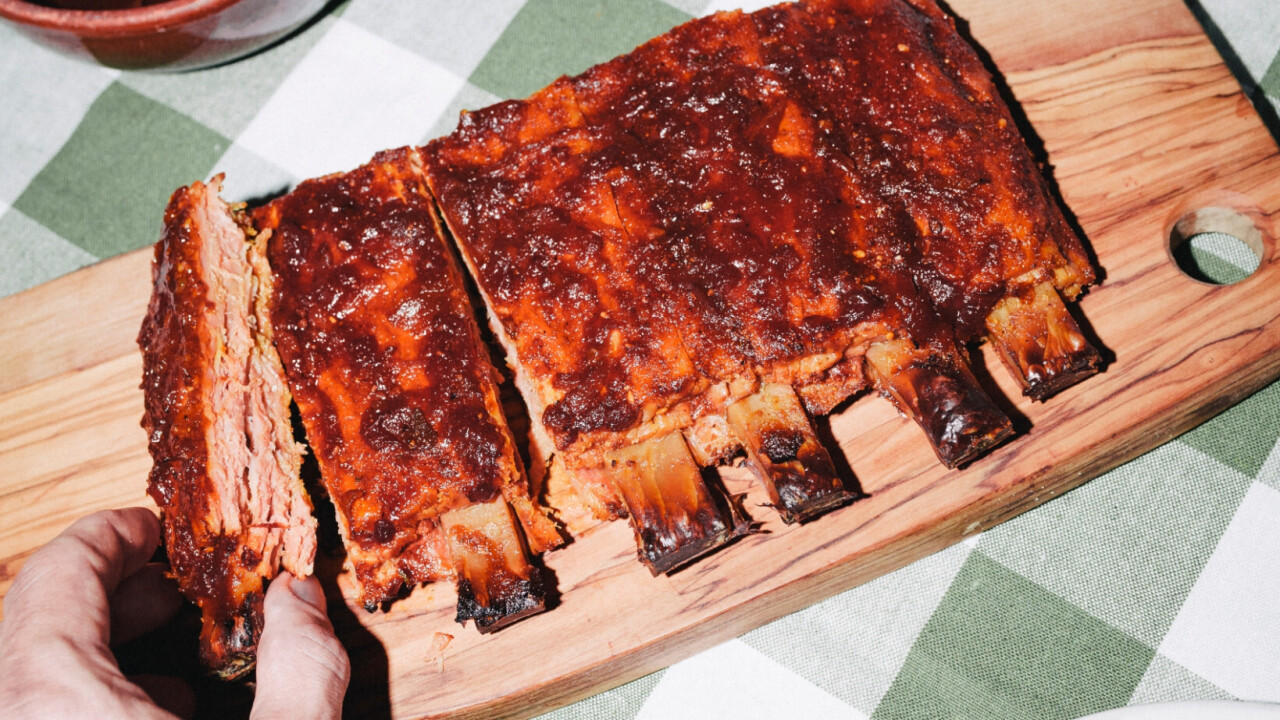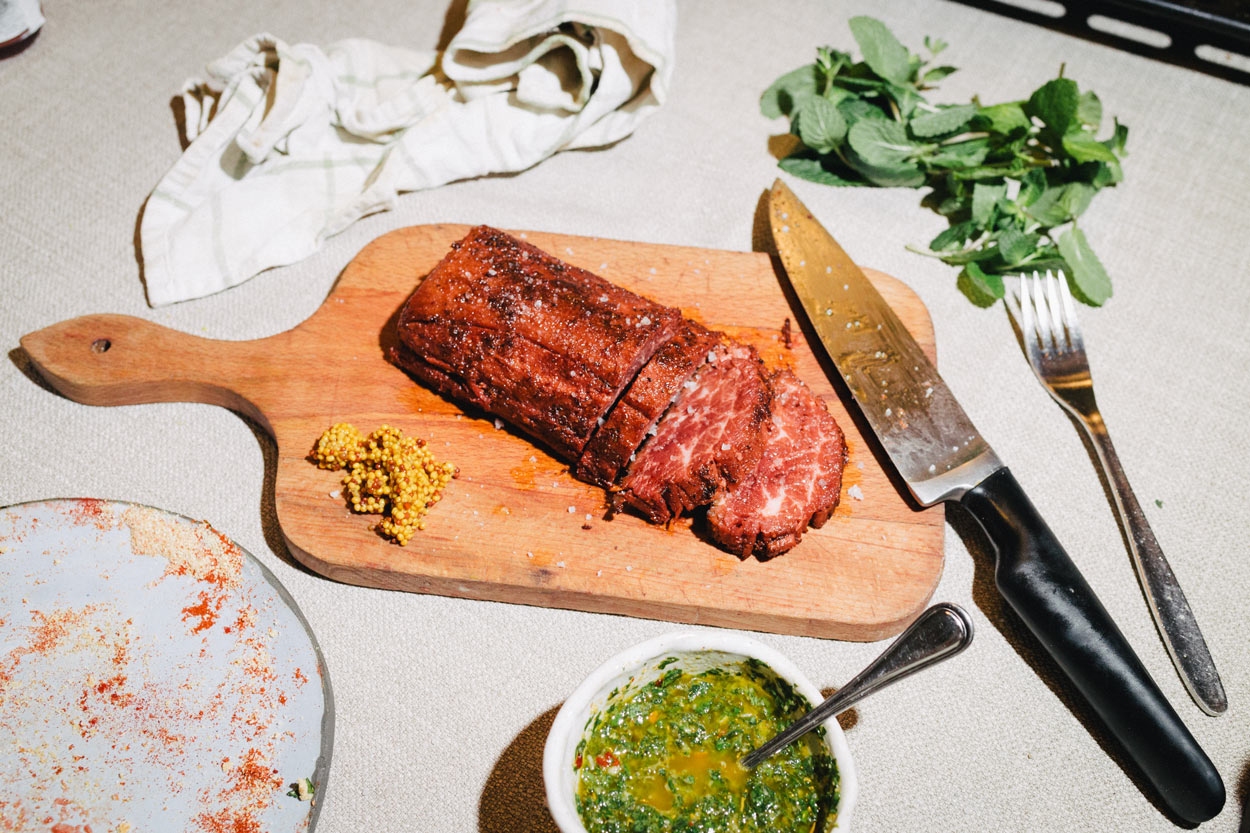
Hailing from South Africa, I like to think of myself as a bit of a barbecue virtuoso. Come rain or shine, most weekends I’ll be out in my backyard, tongs in hand, manning the grill like a meat-addicted maniac (guilty as charged).
So when someone suggested I try the world’s first plant-based ribs, adorned with edible vegan bones, you can imagine I was more than a little sceptical.
The ‘ribs’ in question were made by Slovenian food tech startup Juicy Marbles. The company says it wants to recreate the “shared sense of nostalgia” and “primal joys” of eating ribs — but without the negative environmental impact.
And the vegan bones? Well, apparently, they’re just for a laugh.
“To some, bones from plants may be an ideological provocation, but we shouldn’t take these things too seriously,” says co-founder Vladimir Mićković. “It’s just fun from every angle. Bones invite you to eat with your hands, to tear off succulent chunks of meat, and share that indulgence with the whole table.”
While the idea of replacing a succulent steak with a hunk of soy protein didn’t exactly tickle my tastebuds, it did niggle my conscience. You see, dear reader, perhaps greater than my hankering for flesh, is my love for our planet. And, unfortunately, the two don’t really align.
Spurred on by climate guilt, I decided to give the imitation ribs a try. So, I fired up the grill and cooked them the same way I’d prepare pork ribs — over hot coals and smothered with sticky, sweet basting sauce. Yum!
Check out my recipe here:
Currently, the bone-in ribs are only available in limited releases in the EU, UK, and US — at a premium of €66 per kilogram. Being a distinguished TNW reporter, I was lucky enough to be sent one of the first packs for free. (The vegan ribs will launch for regular purchase on the company’s webshop in early 2024).
Founded in 2020, Juicy Marbles is perhaps best known for creating the world’s first marbled plant-based steak. Our resident senior reporter (and vegetarian) Thomas Macaulay already tested these last year and was, perhaps predictably, satisfied. But would the startup’s latest offering really indulge the taste buds of a savage carnivore?
Upon delivery, my first impression was that the ribs looked pretty similar to the real thing — the addition of ‘bones’ and beetroot juice (for colour) definitely helps with the aesthetic.
Encouraged, I began prepping them for the ‘braai’ (what we call BBQ in my homeland). Overall I was quite impressed with how these plant-based ribs held up on the grill. The outer layer crispened to perfection, and generally, the rack looked delicious — although it did begin to break apart towards the end. Total cook time was around 10 minutes.
The taste test
As advertised, the ‘meat’ is succulent and flakes off the ‘bone’ with ease. But it has more of the texture of pulled pork than pork ribs. Minor qualm there.
The taste was decent — it reminded me somewhat of other soya-based products I’ve tried but with more meaty substance. This is probably thanks to Juicy Marbles’ patent-pending 3D assembly system which layers the proteins into linear fibres, which mimic the muscle structures of meat. The ribs also did a good job of absorbing the spices and marinade.
As for a convincing replacement for a rack of pork ribs? I’m not so sure.
The spoonfuls of sunflower oil added to the soya protein simply cannot replace the deliciousness of real pig fat. And the flavour profile feels unidimensional compared to the real thing.
My biggest gripe however was how stuffed they make you feel — these plant-based ribs hit your stomach like a tonne of bricks. The high soya protein and oil content are probably to blame for that.
And what about the edible vegan bones you ask? Well the bones, which apparently have the same protein content as beef jerky, are purportedly meant to be fried or baked as a crispy snack. Maybe I did something wrong, but after 10 minutes in the air fryer, my bones still remained chewy — perhaps edible, but definitely not enjoyable. Nevertheless, they remain a cool addition, even if just for show.
Sharing is caring
Juicy Marbles says it wants to recreate joys of eating meat with others, and that’s where I think these bone-in ribs really hit the mark. I’ve often felt like vegans or vegetarians are excluded from the shared pleasures of a BBQ simply because they don’t devour animal protein. But plant-based whole cuts could unite us all around the fire.
“Anyone cutting down on meat can probably confirm that the hardest part is not missing meat’s flavour, but feeling excluded from cultural traditions,” explains Mićković. “That’s why we chose ribs as our next product — we wanted to create something that evokes the primal joys of sharing food.”

Overall, I was left feeling impressed by the world’s first plant-based bone-in ribs. This was definitely the most realistic plant-based whole cut I’ve tried (as opposed to a burger). The texture and addition of bones make it pretty legit. For what it is, I think Juicy Marbles did a great job.
The pursuit of plant-based meat perfection could also have benefits beyond bonding with your brethren behind the barby.
Converting the carnivores
One recent UK study found that almost 90% of consumers who ate plant-based meat and dairy were meat-eaters or flexitarians. Another found that plant-based products with a similar taste, texture, and price to processed meat had the best chance of replacing meat.
While products like plant-based burgers, steaks or ribs aren’t always enough to turn carnivores into vegans, they have been shown to reduce overall meat consumption, which is good for the planet and our health.
Livestock farming contributes 15% of all greenhouse gas emissions, uses 78% of agricultural land worldwide, and sucks up an estimated 25% of all potable water. Moreover, plant-based meat products are generally healthier than their processed meat equivalents.
So maybe Juicy Marbles’ pursuit of plant-based meat perfection is also meaningful way to shift our diets in a more sustainable direction.
Europe leading the shift
Despite the benefits, demand for plant-based meat actually declined in the US last year, while Silicon Valley plant-based burger poster children Beyond Meat and Impossible Foods have been losing money and customers.
However, the picture looks more promising in Europe. The plant-based food sector here has grown by 49% over the past two years.
Figures from the German Agriculture Ministry show that meat consumption dropped to 52 kgs per person in 2022, the lowest figure since records began in 1989.
Meat consumption in the Netherlands is also declining.
Many experts believe that the rise of plant-based alternatives has had a direct impact on the reduction in meat consumption in Europe. Another contributing factor could be that recent soaring inflation has closed the cost gap between conventional meat and plant-based alternatives, which are usually more expensive in supermarkets.
Whatever the reason may be, plant-based alternatives are here to stay. As the costs begin to decline, the benefits become unequivocal and the options become more legit than ever before, I think it’s likely that plant-based whole cuts like Juicy Marbles’ bone-in ribs will become a common fixture at the barbecues of the future. Herbivores delight!
Get the TNW newsletter
Get the most important tech news in your inbox each week.




